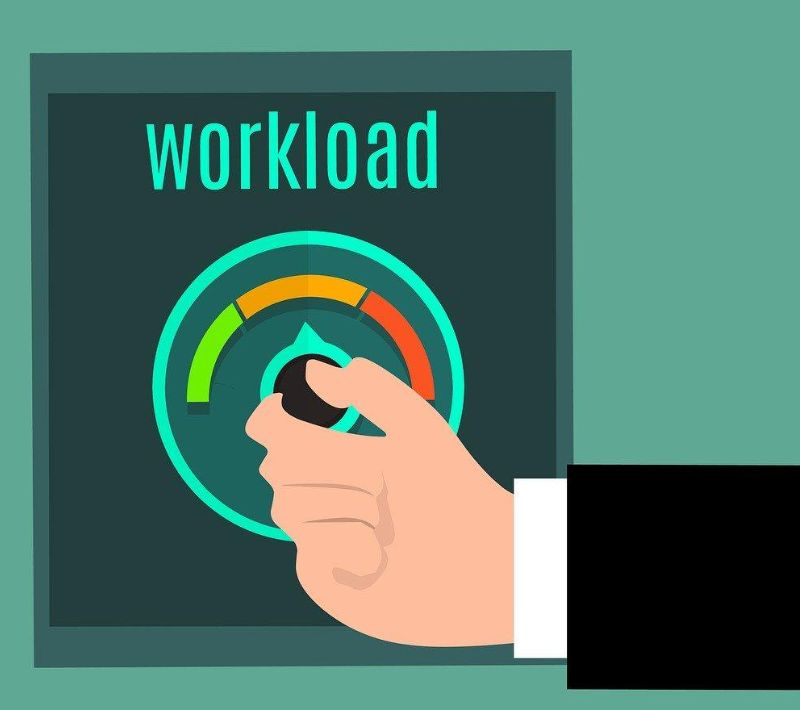How to Tell Your Boss Your Workload is Too Much

If your workload is too much on a normal day, a smart 3-step tactic will help you have a much-needed conversation with your superiors. Although this is to ensure that you work your way up, we constantly have too many burnouts in the workplace. Therefore, there is a problem to tackle!
You are not alone if you are struggling with a considerable work-overload, an always-busy schedule, and a clear stress surplus. You are either ‘busy busy busy’, or you are being a loser, not working hard. That seems to be the social norm nowadays. It is safe to say that there is a true burnout epidemic.
Let’s face it. Being nice and busy is not bad at all. It only becomes a problem when you are too busy. Having crazy schedules and needing to meet up with deadlines. To the extent that everything you do outside work feels like a sin.
You understand what I’m talking about.
But how do you tell your boss (the person who can do something about it) that you suffer from excessive work pressure? That you really can’t get it done this way anymore? That your workload way is too much? That you simply don’t get it arranged in the hours you have before?
That’s a tricky one, it seems. Your boss assumes, in all likelihood, that you are just doing your job. Just like any other employee. You get assignments, you get projects, you get individual tasks – and you perform them. That is how it works. Can you get away from it? And not come across as a huge failure? Come across as someone who does not succeed, while there seem to be so many others who succeed. Make you feel like something is wrong with you?
The answer is, no. There is nothing wrong with you. But the fact that you get feelings like this makes so much sense. The Work Coach and Author of the book ‘Never Check E-mail in the Morning’ said:
Deep in your stomach, you have the feeling that if you can’t handle the high workload, there is someone else who can; you feel unnecessary. Secondly, you have a natural tendency to think ‘I don’t work hard enough, I am not smart enough or not efficient enough. I should just be able to handle this’. So you suffer in silence.
However, suffering from high work pressure is not necessary for anything. It is a fantastic and necessary move to tell your boss. It sounds counter-intuitive, but it is true. If you don’t tell your boss that you have more work than you can handle, it is guaranteed to go wrong. You go to work in a hurry, make mistakes, deliver poor quality, receive comments, shrink confidence in your abilities and before you know it your boss starts to doubt whether you are still suitable for your position and for the organization.
Liane Davey, author of the book ‘You First’, a book about smart teamwork, agrees:
With a high workload, you do your best extra because you are ambitious and you want your boss to be impressed by you. But if you do not deliver what you have promised – or deliver hasty work of poor quality – it shows that you are not very capable and reliable.
Saying no to high work pressure is, therefore, the opposite of failure. It is a move to prevent your failure.
I repeat that again, just to be sure:
Saying no to high work pressure is the opposite of failure. It is a move to prevent your failure.
In addition, saying no to – or having a conversation about – your high work pressure shows that you take your responsibilities in the quality of your work. You oversee that your schedule cannot handle the amount of work, and you take the initiative to solve that problem – and prevent it from becoming a debacle.
Liane Davey says:
Employers want their employees to tell when something is wrong that limits their performance. […] It is the most responsible thing you can do for the organization. When the work grows upside down and you cannot finish what you promised you would do, you abandon your organization and your team.
The message may be clear: say it when your achievements suffer and/or you personally suffer from excessive work pressure. Start that conversation with your boss. And don’t be afraid. It doesn’t have to be an annoying conversation. On the contrary, it can be very pleasant and make you grow in prestige with your manager.
Provided you present your case well. And how do you do that? With these three clear steps.

Tell Your Boss Your Workload is Too Much – in 3 Steps
You are ready. You realize that it really is no longer possible. If you continue under this high workload, then you will collapse or your work will collapse. Or both, even more likely. Ultimately, the only solution for this is to make it negotiable with your supervisor. He or she is the one who can change something about the number of projects in which you participate, the number of tasks in your position or the number of customers or cases that you manage. Your supervisor is the one who can solve your problem for you, but then you have to come up with a good story. And a cup of coffee, maybe.
This is how you can start the conversation in 3 consecutive steps:
1. Emphasize the Company Vision
Open the conversation as soon as you speak and start discussing your high workload with the company philosophy. Not a whole argument about missions and visions, but an emphasis on the part that is not consistent with a high workload. For example, the organization wants to deliver services or products of the highest possible quality. (That will not work with your persistent high workload). Or the organization aims for optimum efficiency in the working method of the employees. (Your workload has long risen above the efficiency barometer.) Emphasize your science and recognition of these core values of the organization.
For example:
“I know that at [our organization] we stand for a constant level of quality products. Nothing less than the best. And I am completely behind that … “
After establishing this, then you can move on to the next step.
2. Emphasize The Pressure Problem
Explain that your towering workload hinders that vision. You cannot constantly deliver perfect work if you always have to produce it in a hurry. Hurry and busy guarantee less output and at least a few errors.
For example:
“… In the last few weeks, I have noticed that my agenda is so full and that the workload is so high – that I cannot guarantee the quality that we all strive for. The philosophy is rather ‘as long as it’s finished’ than ‘as long as it’s good’. That produces work of inferior quality than what we stand for at [our organization]. I don’t like that … “
– And then you come to the final step. One that shows your boss even more that you not only work with insight but also with a solution-oriented vision. And a strong sense of responsibility.
3. Come Up With The Solution(s)
You come up with (suggestions for) solutions. “Never go to your boss with a problem unless you have a solution,” is the literal advice from Morgenstern. “It confirms your identity as a responsible employee who is committed to the success of the organization.” He continues.
For example:
“… To solve that problem and reduce my workload, I think it’s smart to do [task x] every quarter from now on instead of every month.”
“… To solve that problem and reduce my workload, we could hire a temporary worker for [project x].”
“… To solve that problem and reduce my workload, I would like to call in the help of a colleague to keep [customer x] satisfied.”
In this way, you show insight about the pain point and you show that you also thought further. With your suggestions for solutions, you meanwhile steer your supervisor in the right direction. This would help both of you to really come to a solution together. Otherwise, the problem may be left open or the issue will no longer be discussed. You must immediately take action.
Do not automatically assume that your boss will immediately agree with your solution. However, there is a good chance that he or she will continue to think in that direction. Thanks for your pass.
Bonus tip: plan a new conversation at the end of your conversation in which you look further together for concrete solutions and indicate that in the meantime you are happy to think about solutions if that helps.
How To Directly Say No To High Work Pressure

Is your boss coming up with a new project on top of your already full agenda? Avoid an even higher workload on the spot, if you are unsure whether you can handle it. You do not immediately shout “NO!”, But tackle it in a 3-step way:
“Many times bosses hand out work without a single idea of how much time a task will cost the employee,” explains Liane Davey. “You respond by explaining which priorities you already have on your plate and then asking your boss which tasks have the highest priority because you cannot do them all at once.”
Or say, if you cannot immediately respond to your agenda in such a substantive way because you do not yet have a good overview (which you also learn to create quickly in a modern time management course):
“Let me know exactly what you expect from me in this project and then I will find out what I can do next to the other projects I am already working on. Is it okay if I come back to it tomorrow?”
Do you see that? You immediately provide insight, detect the problem and propose a solution: prioritizing. One task, but not the other, because it is impossible for you to do it all (well). That is the moral of the story.
The whole point of this article is this; If your workload is too high, you can delegate or delete certain tasks better if you want to have everything run smoothly. You not only have yourself but often also your team and ultimately the entire organization.
So a better idea is not to wait and to raise the problem with your boss immediately. You must also come up with a solution suggestion. This shows insight, responsibility, and commitment instead of stubbornness and ultimately poorly delivered work.
Your boss likes to hear it when something gets in the way of your productivity. Because ultimately he wants healthy employees who consistently deliver good work. Rather that, than a bunch full of burnouts and nobody to be able to do the work at all.
If all these simply don’t work, then do you know you can take a day off?
If your boss does not realize that reducing the workload is a good idea and you still get an indignant or negative reaction in this conversation (without arguments that make sense), then I can only say that you are dealing with a bad boss. Lack of vision. Insufficient insight. Failing leadership.
In that case, an option is to raise the matter with your immediate colleagues, who can then take it into account by relieving you or at least showing understanding within the team when you deliver half the work.
However, this is only a short-term solution. Your work is simply no longer fun this way, and ultimately there is only one thing to it.
Tip
- You could register now for e-mail newsletters by organizations that emphasize employee efficiency.
- You could also get some self-help books. It could be e-books or even paperbacks. ‘Better Sleep, Smarter Working’ is a good start.
- If your boss is unrelenting in reducing your workload, then you might need to start looking for a new job.
According to Morgenstern:
If your boss is and remains insensitive to your high workload, then you should see that as a signal that you have to look for another job. Working overtime yourself is not sustainable in the long term.
Remember, you are not indispensable. Someone else would take your place in a second. That is enough for you to realize that you MUST take care of yourself.
Let that job go if it’s costing you too much of yourself.
You’ll be just fine.
All the pictures are from pixabay, free for commercial use and no attribution is required.
She's an African, Afro-American breed. She's way too radical in her writing style. She adds in a little childish nature to the mix, representing all you want to be but can't.

